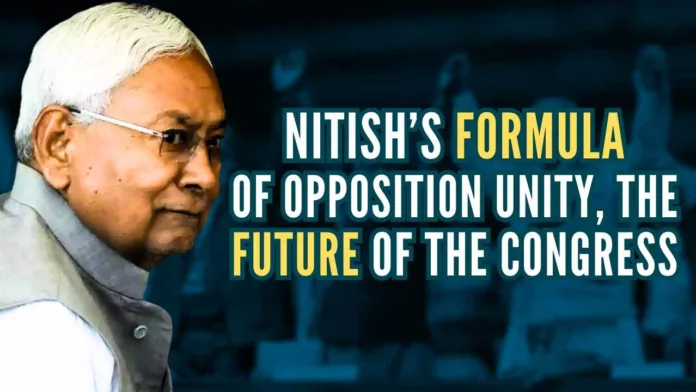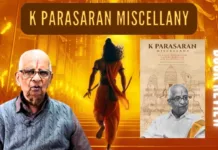
Nitish Kumar takes the lead in uniting opposition
As the 2024 Lok Sabha elections approach, the quest for opposition unity to take on the BJP’s electoral might gets more desperate. Leading the pack, for now, to cobble together a front, formal or informal, to defeat the incumbent governing party at the Centre, is Bihar Chief Minister Nitish Kumar. A clutch of opposition leaders are set to meet in Patna soon on his initiative to take his desire forward.
Losing ground in his own home state and hobbled by a dominating partner in the RJD, Nitish Kumar is eager to re-establish his credibility. He knows that his days in Bihar’s politics are numbered since the RJD will not allow him to keep the reign of the state for long. He wishes to reinvent himself for the national stage to keep himself relevant. He also wants to send a message to the BJP that even without it, he can survive well enough.
Nitish Kumar has come up with a remarkable solution: Opposition parties must get together and pit one common candidate against the BJP across the country. This way, he reckons, the BJP can be limited to under 100 Lok Sabha seats in 2024. The problem with his solution is that it is unworkable and looks good only on paper.
Let’s consider the scenario in some of the politically important states. In Uttar Pradesh, for instance. The main opposition party, the Samajwadi Party (SP), will want to contest the maximum number of seats and expect the Congress and the Bahujan Samaj Party (BSP) to back its candidates as part of the understanding that Nitish Kumar is batting for. But will the BSP and the Congress settle for the few seats left for them as crumbs? Unlikely, because conceding to the arrangement would be akin to political harakiri. Both the parties can then say goodbye to their prospects in the state for the next twenty five years.
And, because Uttar Pradesh contributes as many as 80 seats to the Lok Sabha, the Congress will struggle to remain relevant as a national party if it ends up getting say, just five seats to contest; as it is, even after fighting on most of the seats, it had won just one in 2019.
Now, let’s come to Bihar. The RJD will demand the maximum number of seats, relegating Nitish Kumar’s Janata Dal (United) and the Congress to the margins. Nitish Kumar, left with no choice, might swallow the insult, but will the Congress accept the subordinate position? If it continues to leave out a majority of seats to its allies in important states such as Bihar (and Uttar Pradesh), it will not be able to establish a pan-India presence in the Lok Sabha.
In both Rajasthan and Madhya Pradesh, the Congress and the BJP will be locked in a bipolar contest. In these state, it makes no difference to the Congress whether the opposition is united or not. And in Punjab, Nitish Kumar’s experiment is unlikely to work, unless both the Congress and the Aam Aadmi Party join hands. Is that even possible, given the fact that the two parties are bitterly opposed to each other in Delhi? And, if, in an act of self-destruction, the Congress does agree to the formula, it will face resentment and even a possible rebellion within its ranks in Delhi.
Now, for the other important state — that of Karnataka. Flush with an Assembly victory, the Congress is in a pole position there. Assuming that Nitish Kumar’s formula gets accepted, the Congress will seek to push out the regional party, the Janata Dal (Secular), leaving it with fewer seats than it would desire. With H D Deve Gowda’s virtually out of the day-to-day decision-making process due to health issues, it is unlikely that his son and effective leader of the party, H D Kumaraswamy, will be inclined to humour the Congress party, given his bitter experiences of working with it earlier.
In the other southern states, barring Telangana, Nitish Kumar’s idea is immaterial. The BJP is not in a strong position in that region. Will the BRS in Telangana accommodate the Congress party? K Chandrasekar Rao has his own ambitions of being a national player and has been conducting his own exercise at opposition unity. It is unlikely that the BRS will agree to share seats with the Congress, which has over the years lost its hold over the state, with the BJP replacing it as the main opposition for all practical purposes.
And, then there is West Bengal. There is no compelling reason for Mamata Banerjee’s TMC to accommodate the Congress party in the state, because the Congress has been marginalized there, and can bring nothing to the table. Besides, there is nothing to suggest that Mamata Banerjee desires to resurrect either the Congress or the Left Front by giving them seats and then helping them to win.
Finally, Maharashtra. Here, thanks to Sharad Pawar, there is a better chance for the Nitish Kumar’s formula to work. But then, there is already opposition unity there and, Nitish Kumar or no Nitish Kumar, the arrangement will be put to implementation.
There are states such as Odisha and Andhra Pradesh that have been lukewarm to Nitish Kumar’s agenda. Neither of the regional satraps in these states have any use of his solution, since both of them are capable on their own to take on the electoral challenges.
In a nutshell, the party that will be most negatively impacted by Nitish Kumar’s solution is the Congress. It has little to gain and the most to lose if it surrenders to regional parties —which it will have to — as part of the formula. It has in the past had alignments with both the BSP and the SP in Uttar Pradesh, and the results were dismal for it. Will it repeat the blunder?
Note:
1. Text in Blue points to additional data on the topic.
2. The views expressed here are those of the author and do not necessarily represent or reflect the views of PGurus.
PGurus is now on Telegram. Click here to join our channel and stay updated with all the latest news and views
For all the latest updates, download PGurus App.










